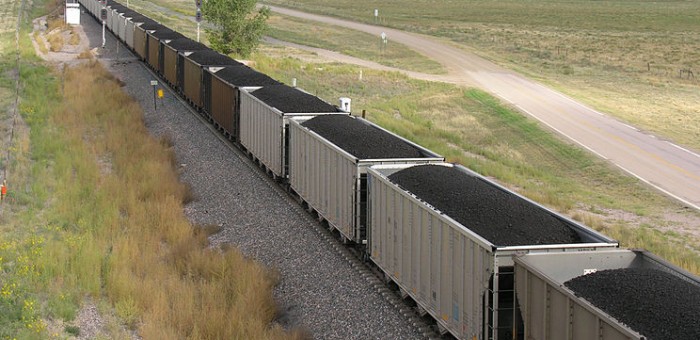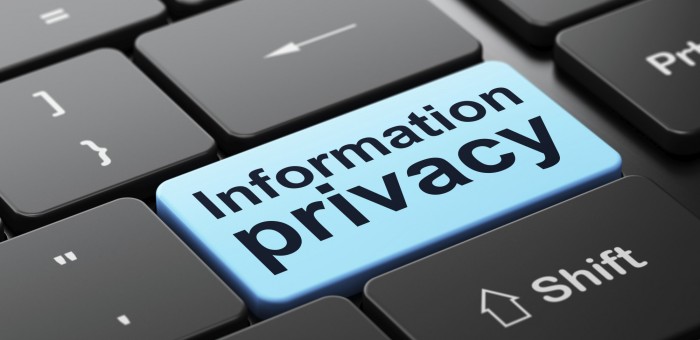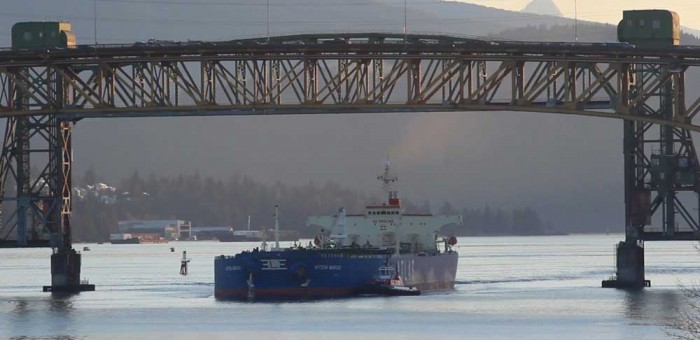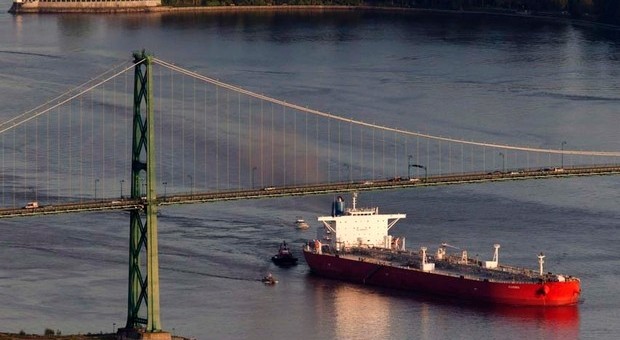Government Response to Questions about FSD Air Quality Case
Right now, Metro Vancouver is embroiled in a court case with Fraser Surrey Docks LP (FSD). The outcome of that case, which is being fought over a relatively minor $1000 fine, will have important implications for our province’s ability to regulate air quality.
Here’s the essence of it: Air quality falls within provincial jurisdiction. This means that the provincial government has the power to set and enforce air quality standards. The British Columbia government has chosen to delegate some of that authority to Metro Vancouver so that it can enforce those standards on behalf of the province. When Metro Vancouver tried to enforce its standards on FSD after soy bean dust was discharged in a manner contrary to regulations, the port refused to pay the fine. Their view is that ports are federal lands, under federal jurisdiction— provincial air quality laws do not apply in the same way. So the courts now have to decide if the province has the power to regulate air quality at FSD.
Why does this matter?
Because if the province can regulate air quality on port lands, it could theoretically use that power to stop certain port activities, like the expansion of thermal coal exports that is currently underway at FSD.
Thermal coal is the single biggest contributor to global warming. Unlike metallurgical coal, which is mined in B.C, thermal coal passing through our ports largely comes from the U.S., meaning that it contributes to only a handful of B.C. jobs. Stopping the expansion of these exports would represent an important step forward in the transition to a low carbon economy.
Yet, there’s also a bigger issue here: British Columbians should have a right to regulate their own air quality. After all, we’re the ones that breathe it.
Given the significance of this court case for our province, I asked the government to clarify its role. Specifically, I asked:
- What is the government’s position on the validity of the ticket (#006035) issued to Fraser Surrey Docks LP by the Greater Vancouver Regional District for the discharge of air contaminants?
- In your government’s opinion, how far reaching are the powers surrounding air quality that you have delegated to the Greater Vancouver Regional District? Do they include federal port lands?
- What is the historic and current involvement of the province in this case?
- Following question three, does the province have any plans to either remain involved or get involved in this case in the future? If so, what are these plans?
Yesterday, I received a disappointing response from the Minister of the Environment, Mary Polak. While her letter acknowledged the importance of the court case, she was clear that the government “will await the court’s decision before commenting further.”
I understand the desire not to comment on a matter that is before the courts. Yet, I would hope that with an issue as fundamental as the quality of our air, our government would be more open with British Columbians about the role they are taking in the case.
The courts will rule in the coming months on the validity of this air quality permit. When they do, we should all be looking to the provincial government to see what it will do to help stop the expansion of thermal coal exports and to protect our right to healthy air in B.C.
Green MLA calls for more time to consider Election Amendment Act
Media Statement – May 26, 2015
Green MLA calls for more time to consider Election Amendment Act
For Immediate Release
Victoria, B.C. – Andrew Weaver, M.L.A. for Oak Bay-Gordon Head and Deputy Leader of the B.C. Green Party, introduced an amendment today that called for an additional six months to consider the significant consequences of Bill 20 – the Election Amendment Act. If the bill is enacted, it would provide political parties with private information concerning who did or did not vote in a previous election or by-election. It also creates an election financing free-for-all in the pre-writ period.
With comprehensive individual voter turnout records, political parties can match voter records to their existing data on who their opponents’ supporters are. Any matches can be targeted with highly efficient voter suppression tactics to keep opponents’ supporters away from the polls. These tactics are already common in elections, but their effectiveness varies based, in part, on the quality of targeting data.
With the elimination of pre-writ spending limits, the government has opened the doors for more money to pour into B.C. elections. This further increases the issues of election financing in BC – a jurisdiction that already allows anyone in the world to donate to BC political parties, and allows union and corporate donations.
“This bill will have serious consequences for our democracy,” says Andrew Weaver. “There is no evidence that these changes will increase voter turnout and government knows it. British Columbian’s were never asked whether they wanted these changes – I think we need to give them time to have a say.”
Yesterday during committee stage debates, Minister of Justice, Suzanne Anton, acknowledged the lack of substantive evidence to support the government’s claim that this would improve voter turnout, stating: “This is not based on peer-reviewed literature. This is based on election organization experience.”
“As it stands, this Bill offers clear tools to suppress the vote but only offers the government’s word that it will increase it,” says Weaver. “The fact that this information is being provided after an election raises significant fears that it will be used for voter suppression. The Privacy Commissioner has been clear that the bill needs to be amended. We need more time to address her concerns and to consult the evidence.”
Andrew Weaver’s amendment was supported by Independent MLA Vicki Huntington and by the Official Opposition. It was defeated by the government on a vote.
Bill 20 requires Royal Assent before it is formally enact into law.
-30-
Mat Wright
Press Secretary – Andrew Weaver, MLA
Cell: 250 216 3382
Mat.Wright@leg.bc.ca
NEB Denies My Motion for More Adequate Answers
For more than a year now, I have been trying to get Trans Mountain to answer my questions on their pipeline proposal. As an intervenor in the National Energy Board (NEB) hearings, getting answers to questions is an essential prerequisite to offering an informed argument on whether the pipeline should be built or not.
Sadly, today I learned that the NEB has fully denied my second and final opportunity to get answers to essential questions. What is even more troubling is that I’m not alone.
Collectively, intervenors challenged 1,291 of the roughly 5,700 questions posed to Trans Mountain during the second round of information requests. Of those 1,291 questions, the National Energy Board only ruled in intervenors’ favour 32 times. Put another way, the NEB ruled in Trans Mountain’s favour 97.6% of the time.
Personally, I submitted nearly 100 questions this round and challenged 24 of the answers I received.
To be clear, I was not challenging unsatisfactory answers, or answers I disagreed with. There were many cases where I disagreed with the response that was given, but still received an answer.
Instead, I was challenging answers that simply did not respond to my questions.
Here’s an example:
One of my biggest concerns is that, from the information I have seen, we currently have no capacity to recover sunken or submerged oil. That means that if an oil spill were to occur, and the oil were to sink, we would have no way to clean it up.
For me, this is the line in the sand. We should not be transporting heavy oils along our coast if we cannot clean them up when they sink.
I therefore asked Trans Mountain to provide a list of all equipment owned and operated by Western Canada Marine Response Corporation (WCMRC – the organization that is contracted to respond to oil spills along the B.C. coast) that can be used to recover sunken oil.
In response, Trans Mountain acknowledged that heavy oils can sink under certain circumstances, but failed to provide the requested list. I noted this when I challenged the response, and asked that Trans Mountain provide the requested list. Once again, they did not.
After a back-and-forth, the NEB then gave the following ruling:
Deny – Motion sought information that Trans Mountain is not responsible for, or which is the responsibility of another body (e.g., regulator, tanker operators).
Deny – Motion sought information that may touch upon the List of Issues, but would not contribute to the record in any substantive way and, therefore, would not be material to the Board’s assessment. In some instances, the request was unreasonable or overly broad in scope.
How the NEB can feel that a basic question about WCMRC’s capacity to respond to sunken oil “would not contribute to the record in any substantive way” is beyond me. In my mind, that is one of the most fundamental questions to the whole hearing process. Can we clean up a heavy oil spill? And if we don’t know what equipment WCMRC has, how can we know if we can clean up a spill?
But here’s the other problem:
The NEB has ruled that Trans Mountain isn’t responsible for providing information on behalf of WCMRC. Yet, WCMRC isn’t directly involved in the hearing process. So we have a situation where we cannot get the information on record from Trans Mountain, but we also cannot get the information on record from WCMRC within the formal hearing process.[1]
This brings me back to the essential question: How can the NEB truly evaluate Trans Mountain’s ability to respond to a spill when they seem to have created a situation that denies the Board, and intervenors, the ability to get the information we need?
[1] It should be noted that WCMRC did take the time to meet with my staff and were incredibly helpful. They spent several hours going through their oil spill response plan and answering our questions. However, since that meeting occurred outside the parameters of the hearing process, the information they provided is not necessarily on record within the formal hearings and therefore cannot be considered by the National Energy Board.
Bill 23 – A MultiGenerational Sellout
In the not too distant future we will be moving to 2nd reading of Bill 23, The Miscellaneous Statutes Amendment Act. Included within the bill are three profoundly troubling sections.
If these sections pass, powers would be granted to the Minister to single handedly enter into secret agreements with oil and gas companies, without any clear oversight.
These agreements, parts of which can be withheld from the public, would dictate how much—or how little—British Columbians would benefit for our natural gas resources. And given what we’ve seen from this government so far on the natural gas file, it would not be unreasonable for us to be concerned about backroom deals that amount to hand outs of public resources at rock bottom prices.
Here’s what you need to know:
The most concerning points in Bill 23 pertain to changes to the way Royalty Agreements are managed under the Petroleum and Natural Gas Act. Under these changes, the Minister is granted the power to enter into secret agreements with oil and gas companies without the approval of Cabinet.
Once an agreement is signed, the Minister is not required to disclose any sections to the public that could reasonably be withheld under the Freedom of Information and Protection of Privacy Act (FOIPPA).
The question is: who decides? And what oversight exists to make sure our right to know is protected?
If the Minister is able to enter into these agreements without the approval of Cabinet, then does the rest of government even have access to them if they go unpublished?
My concern is that the act doesn’t specify any of this. So presumably right now, a secret agreement could be signed by the Minister without any oversight or approval from Cabinet. The Minister could then potentially keep important sections of that agreement from the public because he or she feels that would be okay under FOIPPA.
Yet, it goes even further.
Those agreements could lock us in for decades. In fact, it’s up to the Minister to determine how long they last, as long as the timeframe does not exceed the maximum timeframe set by Cabinet. The number that has been floating around is 25 years.
Under the agreement, the Minister can also set any terms or conditions he “considers necessary or advisable.” Presumably, these could include conditions the government must meet as well.
For instance, oftentimes agreements include exit clauses and penalties. So if a future government decides that an agreement signed by a current Minister is so egregious that we need to pull out, British Columbians may have to pay the company to do so. The problem, again, is that we may never know how much that would cost until it’s too late.
I am concerned that this is yet another attempt by this government to sell out British Columbians and their natural resources in an absolutely desperate attempt to fulfill their irresponsible election promises which at no time have ever been grounded in reality. The simple fact is – there is a global glut of natural gas in the market, demand is dropping as countries aggressively move to renewables, and BC is just not competitive enough in the LNG industry as we are so far behind other jurisdictions (not to mention that LNG prices have been plummeting and it is no longer economical to ship LNG from BC to Asia unless BC goes so far as to pay a company to do so). And Bill 23 takes the generational sellout, embodied in the Liquefied Natural Gas Income Tax Act, to a whole new level — A multigenerational sellout.
Even if this is not simply a handout for the LNG industry, the fact remains that there are legitimate concerns that the secret deals that this bill would allow could amount to handouts of public resources to companies. British Columbians should be outraged. And I will be vigourously opposing this bill in the weeks ahead.
We’ve Got Lots to Learn from Vancouver’s Oil Spill
Since last weeks’ oil spill in English Bay, British Columbians living in the lower mainland and across the province have felt let down by their governments.
Despite big promises about ‘world class’ spill response, what we witnessed in English Bay proves beyond a doubt that the term ‘world class’ amounts to little more than a soundbite.
You could, however, forgive British Columbians for feeling let down for another reason. They have been watching as their politicians fall over themselves to point fingers and lay blame at their opponents’ feet.
Concerns about oil spills have been growing in B.C. ever since Enbridge’s Northern Gateway pipeline was first put forward. With Kinder Morgan’s proposed Trans Mountain pipeline routed to come straight to Vancouver harbor, those concerns have come even closer to home.
Many people are now seeing first hand how unprepared we are for a spill.
However, our lack of response capacity doesn’t come as a surprise to anyone who has been paying attention to the Kinder Morgan hearing process.
As I write this, we are in the midst of a seriously flawed National Energy Board hearing process on Kinder Morgan’s Trans Mountain pipeline. If approved, the number of oil tankers leaving Vancouver harbor would increase by 580%.
In contrast to the 2700 litres that spilled, each of these tankers would carry up to 110,000 tonnes of oil along our coastline. Unlike the bunker fuel that spilt in English Bay, which largely floats, the diluted bitumen that these tankers would carry can sink. If that happens, we currently have no way of cleaning it up.
To date, Kinder Morgan – through the hearing process – has refused to consider even the possibility of a spill larger than 15% of what a single tanker would carry. When they did simulate a spill, they applied unrealistic conditions assuming, for instance, that wave and wind conditions would be minimal and that there would be 20 hours of sunlight in August for clean-up crews. (For the record: You would have to go to Tuktayotuk on the Arctic coastline to find 20 hours of sunlight in August!).
Roughly one third of the nearly 600 questions I submitted were not adequately answered. And I’m not alone.
The Cities of Burnaby and Vancouver have been true leaders in the hearings. Together they have submitted thousands of questions to Trans Mountain and countless motions as they advocate for a better process. They too have struggled to get answers to even basic questions.
Sadly, that same leadership has been largely absent on the provincial scene.
In a process that affects all British Columbians, not a single B.C. NDP or B.C. Liberal MLA even applied to be an intervenor.
This hearing is the best opportunity MLAs have to evaluate our spill response capacity in the context of the proposed increase in oil tankers. It allows us to explore how prepared we are for a spill, and what steps are being planned to address the significant gaps.
My staff and I have poured hundreds of hours into this process, studying Trans Mountain’s application and submitting countless questions.
That is why the finger pointing is so frustrating. It is politicking with a disaster when you have played little role in actually addressing the concerns ahead of time.
The clear absence of provincial leadership in these hearings has allowed us to get to where we are today. Had more MLAs been more vocal, we may have a more rigorous hearing process.
Yet it’s not too late. I have been calling for the B.C. government to pull out of the NEB hearings and hold their own review process for some time now. The B.C. NDP and countless British Columbians have done the same. All that stands in the way is government leadership.
I hope that the spill in English Bay will spark more than just finger pointing. I hope it will serve as a wake-up call that British Columbians need to expect more from their MLAs.
They should expect us to do what’s necessary to prevent a spill from occurring in the first place – not to line up after the fact to assign blame.







